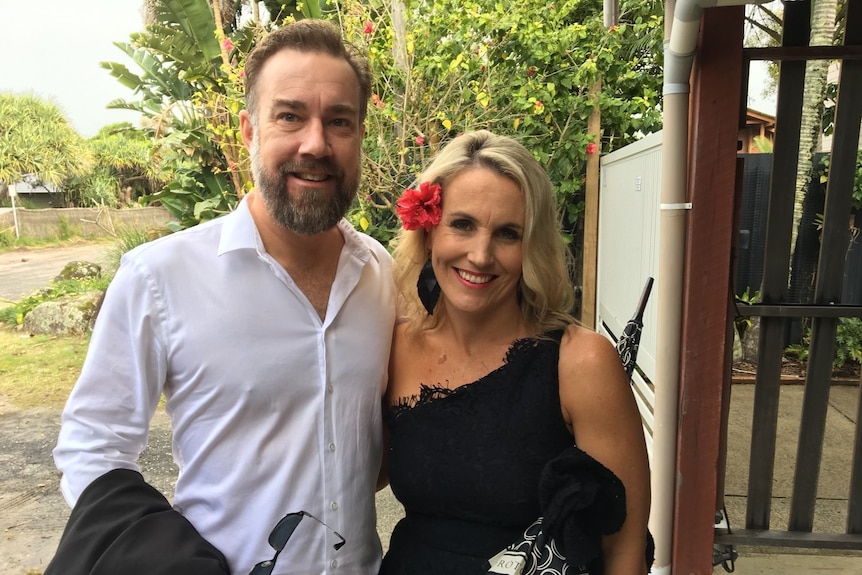How often should you review your will?
Tara Castle was enjoying the school holidays with her children when her husband Joe fell ill.
At first, they thought it might be a bad case of the flu.
But, six years ago, after visiting the doctor to discuss the results of a blood test, Joe was told that his heart was failing and he needed to go to hospital.
Joe, 46 years old and otherwise healthy, was suffering from myocarditis; the virus was attacking his heart. He died in hospital later that week.
After Joe’s sudden and unexpected death, Tara, now 48, has been managing her grief as she tackles the difficult task of what she calls ” the ruler of death”.
Fortunately, Joe had his will. But most Australians don’t. Tara says we all need to have a plan and make sure it’s on time.
“I think we all think we’re here forever,” he says. “My reality is he’s not.

Tara Castle’s husband passed away suddenly in July 2018. (It is given)
When should you update your will?
Gillian Hunter is a lawyer and real estate attorney based in Coffs Harbour, on Gumbaynggirr land.
He encourages people to review their wills, power-of-attorney arrangements, post-retirement death benefit designations and any estate plans at least every two years to three.
Ms Hunter says common reasons to review your estate plan include:
- If someone who has an important role in your will dies or is unable or unwilling to act
- If the person writing in the will is a beneficiary is deceased
- If you are in a new relationship or your relationship has ended
- If you have had children since you last checked your will, or have adopted or adopted children or
- If your plans or financial circumstances have changed
If you’ve had someone agree to take on a role such as a judge, guardian or lawyer, it’s also a good idea to check if they’re still willing and able to fulfill their responsibilities, Ms Hunter says.
“If you have a parent meeting [as executor]and 10 years from now, the parent doesn’t know as much as before, you can think of making a change or at least checking to see if they are still comfortable,” he says.

Lawyer Gillian Hunter says having an up-to-date estate plan can reduce the risk of costly legal battles. (It is given)
Why it’s important to review your super death benefit options
The important thing is that your extra income is dealt with separately according to your will and does not form part of your estate when you die.
To ensure that your salary money goes to the intended person, Ms. Hunter says you can sign a mandatory death benefit option with your super fund.
You should check to ensure that the person you plan to appoint as the main beneficiary is a qualified recipient, according to the terms of the fund.
Many high end funds require these names to be renewed every few years, so it’s worth checking if you haven’t done so recently.
If you die without a mandatory death benefit option, your super fund will decide to distribute the funds according to the pension law.
“Smart estate planning is about controlling who benefits from your estate, so it’s important to avoid uncertainty,” Ms Hunter says.
“We find a lot of arguments tend to arise about being given a lot of money, which can often be a person’s greatest asset.”
Why it’s important to update a will after you get married or divorced
Ms Hunter said many people may not know that a marriage is automatically annulled unless the will is “made specifically with marriage in mind and has a clause to that effect”.
If you divorce, any gifts or agreements made in your will for your ex-spouse can also be revoked, Ms Hunter says.
If you die without a will, laws known as intestacy arrangements will determine who will receive your property. These rules vary by country and region.
Importantly, the authority specified by the terms of the intestacy may not suit your purposes.
Another reason to review your estate plan is if you are separated from your spouse but have not yet divorced or finalized the division of property.
“In that case, your spouse may still be entitled to access to your property, either through a will or under family planning, regardless of your intentions,” Ms Hunter says.

Tara Castle and her late husband Joe. (It is given)
Why does Tara want us to have ‘unofficial’ conversations about our desires
Tara is still dealing with the fallout of Joe’s death. Even now, six years after his death, Joe’s name is still on some bills.
In addition to talking about the will and power of attorney, Tara says it’s important for couples to discuss their wishes.
He found himself wondering how Joe would like to be the parent of the children now that he is gone, or what are the important things that the children would like to know about him.
“Because we didn’t have a quality conversation about it, after all my damage, I had to think a lot,” she says.
“I think there is room to have an informal discussion about death and what would happen next.”
This article contains general information only. You should consider getting independent professional advice about your particular circumstances.
#review

